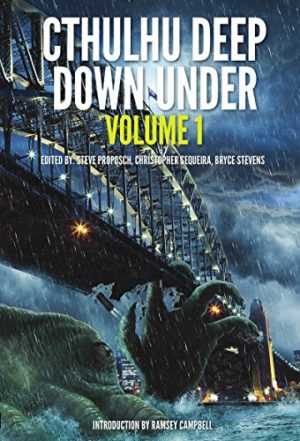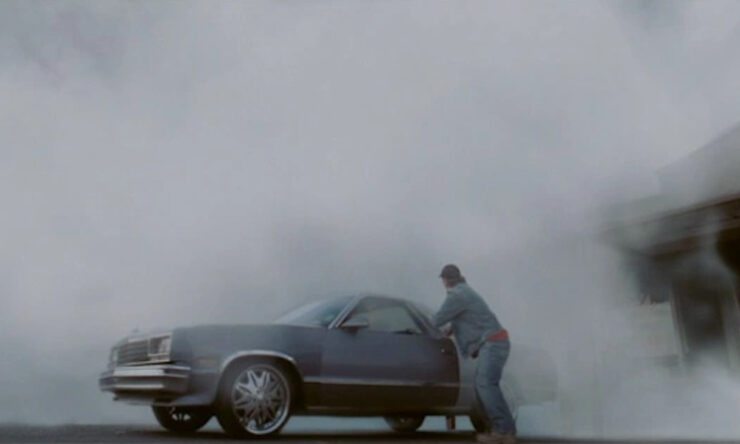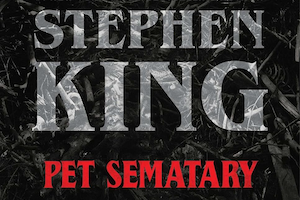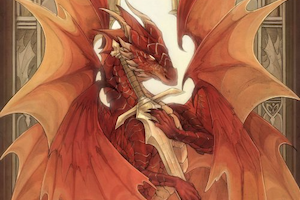Welcome back to Reading the Weird, in which we get girl cooties all over weird fiction, cosmic horror, and Lovecraftiana—from its historical roots through its most recent branches.
This week, we’re reading Kaaron Warren’s “The Diesel Pool,” first published in 2017 in Steve Proposch, Christopher Sequira, and Bryce Stevens’ Cthulhu Deep Down Under, Volume 1. Spoilers ahead.
“No one likes to come down here. Every door hides a ghost.”
Narrator’s father called her “little Jenny Hanniver,” waggishly one assumes, since the term Jenny Haniver refers to a dried fish (usually a skate or stingray) which has been crafted to look like a mythical creature: demon or basilisk, mermaid or dragon. As she offers no other name, let’s go on calling her Jenny.
Jenny has been living in—and sex-working from—her car. She likes to sleep in the parking lot of Canberra’s Old Parliament House. It’s a safe place during the security-lax hours after midnight, and the tent-embassy blokes (encamped Aboriginal Australian demonstrators) look out for her. For additional company, she has the ghosts her father taught her to perceive. He called it waking her dormant organs, so she could “hear the things that dogs bark at, that cats’ ears prick up at,” so she can see “pictures from beyond.” Too bad one of the ghosts Dad saw lured him to his death in a hotel fire, claiming he’d find Jenny’s long-lost mother there.
One ghost who visits Jenny at the House is a fellow she calls Cindy. Formerly an automobile enthusiast, Cindy likes riding shotgun in her ugly-outside, done-up-inside car and telling her about pools of diesel the government’s cached under the House. If he’d learned about the diesel while alive, he could’ve been rich! If Jenny will tell Cindy’s brother about it, the two of them can cash in.
This particular night Jenny dozes off to Cindy’s soothing nattering. A weird thrumming wakes her in time to see Cindy vacuum-sucked out of her car and into the House. Inspecting the wall he vanished through, she thinks she sees a smear of diesel.
Next day Jenny visits the House as a tourist and asks the donation-box lady about Cindy’s diesel pools. Laughing, the lady directs her to Lance, their “resident conspiracy theorist.” Lance, who seems “quite sweet” despite the weird scars criss-crossing his skin, takes Jenny on a private ghost tour. He doesn’t know about diesel pools, but he confides that under the House are tunnels into the deepest dark, and doors that open on rock and dirt, rooms that go on forever, and—way down—a monster.
Jenny notes the warm empty rooms that might afford her shelter, the doors that might give her access. She sees ghosts in the dark corners, maybe even a beckoning Cindy, but she doesn’t mind them. What about the monster? she asks.
Well, Lance’s grandfather says it came from inland Australia, where it had lived in peace until men seeking water dug it up. It killed, was nearly killed itself. Slowly it made its way to the lake under the House.
That kind of monster Jenny doesn’t believe in. A week later, when a customer steals her car, leaving her really homeless, she returns to the House and finds the under-construction corner Cindy’s mentioned. That was where he and his buddies snuck in but not out again; nuff said, Cindy doesn’t like talking about how they died.
Buy the Book
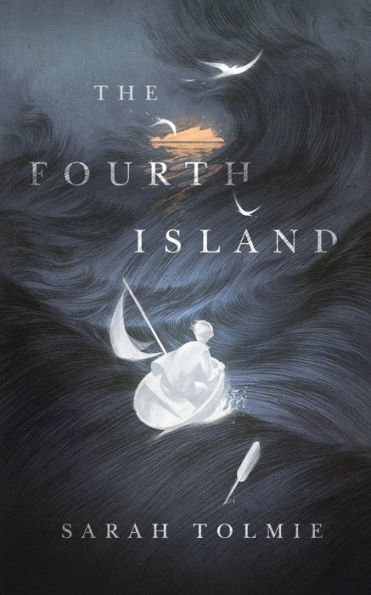

The Fourth Island
Inside she finds footprints that smell of diesel—and Lance. He urges her to come quick—an unspecified “he” needs her. The House seems to breathe in and out, and it’s too dark to make out where Lance leads, but since when did Jenny act on decision rather than compulsion? In that, she’s like her mother—and her father.
Lance admits he’s taking her to the “visitor from the Inland Sea,” which made Lance what he is and which now offers Jenny the “chance of a lifetime,” all in exchange for “the smallest breath.” Speaking of which, she feels strange suctions and blowbacks of air as they descend. She smells diesel and brine, sees strange creatures dancing to a music box tune. But the creatures are really mottled grey tentacles. They beckon, then grip and guide her through a last door to a giant pool of diesel and water. She sees bones, a pile of wallets and gold, Cindy a wasted ghost amid a sea of other lost souls, the monster’s constant companions.
She wriggles free and backs up, into Lance. He’s no ghost, not with a hard-on like the one she notices. She uses his excitement to lure him away from the monster. A tendril pursues them, seizes Lance and drags him off already dead or at least knocked out.
The House falls silent….
Jenny lives in the House for a year, the monster’s new procurer. Most donors it lets live after it’s taken their breaths, as it doesn’t like rotting bodies. Ghosts, like Lance, it doesn’t mind. The tentacles get bolder, venturing toward populated areas. But then foolish men decide to rebuild the basements and invade with masks and welding guns. Jenny glimpses the monster’s burning-lamp eyes for the first time before the foolish men set the diesel lake on fire, to burn a year and a day.
She likes to think the monster has escaped to another lake or to the sea where it can breathe the fresh air it craves. She knows that ahead of the conflagration it spewed out a thousand skittering worms that wriggled away through cracks.
She knows the worms seek breath, too, and she knows they’re “in the water.”
What’s Cyclopean: Jenny’s language is straightforward—it’s only the things she’s describing that are obscure and eldritch.
The Degenerate Dutch: Australia’s colonialist history lurks at the edges of the story, from the tent embassy to the hubris of those who sought water in the center of Australia and found a monster instead.
Weirdbuilding: Tentacles. Why does it always have to be tentacles? (And conspiracy theories, and terrible things in the water…)
Libronomicon: No books this week.
Madness Takes Its Toll: Most people thought Jenny’s dad was crazy for talking about the pineal gland.
Ruthanna’s Commentary
I came to the weird sidewise, via role-playing games and plushies and obscure jokes. From there my first serious, jump-in-the-deep-end introduction to the literary weird was Robert Anton Wilson. I found the Illuminatus Trilogy mind-blowing and mind-warping, in the way some things can be only in the throes of college-age neuroplasticity. And following close behind was the Principia Discordia, then Grant Morrison’s Invisibles… give me an occultopolitical conspiracy, villains trying to immanentize the eschaton, and a resolution that makes sense for exactly 10 minutes until your whole ornate mental model tumbles down like a pack of cards, and I was happy.
Somehow, this is a corner of Weirdness that we’ve encountered relatively rarely in this column. “Dust Enforcer” probably comes closest, while “A Colder War” has the conspiracy but not the “which reality am I in again” psychedelic component. “Diesel Pool” feels more directly Wilson-influenced, enough that I kind of wanted to drag my old futon onto the floor and blast Meatloaf while stretching my mind around Jenny’s reality tunnel. How much of her reported experience is true, and how much is true because it’s what she believes? How would one make a fortune off fossil fuels stored in a public building? What powers does she have, that give her such confidence in her persuasive abilities and such comfort with a displaced water monster?
My middle-aged brain, on the other hand—with its neuropsychologically-orthodox pineal gland usage—notes other resonances. There’s something about Jenny’s narration that reminds me of Jamaica Kincaid’s “My Mother” or Mercè Rodoreda’s “The Salamander.” It’s the way she starts with a different set of assumptions about what can happen at all, and about what a reader might take for granted about what can happen. It’s intimate and alienating at the same time, as one becomes immersed in those assumptions and starts looking at them from the inside. Spend long enough under the Old Parliament Building, and it might change the way you think about… everything. As it has, perhaps, Jenny.
I originally pulled this story from the Cthulhu Deep Down Under table of contents because I thought it took place somewhere I’d been, and I was intrigued by what sort of Weird you could set in downtown Melbourne. However, it turns out that Parliament House and the Old Parliament House are two entirely different things, with the latter having less local nightlife and more nearby parking for dates with ghosts. It still doesn’t seem like the sort of place from which one could simply abscond with stored diesel fuel, but that may be the point. The monster in its depths, after all, was disturbed and displaced by colonizers thinking that the resources of the Australian interior were simply theirs for the taking, not part of any larger structure or system. The fact that the House pops up an Aboriginal land acknowledgment for visitors doesn’t negate the effects of that ancestral sin, or provide the disturbed spirit with the fresh air it (understandably) craves.
The weird has long been concerned with these old, deadly connections: unpleasant inheritances and tainted water. For Lovecraft, that taint was all-too-often the oppressor’s horror at discovering a relationship with the oppressed. One of the strengths of the modern weird is the ability to treat acts of oppression and invasion as directly tainting those who commit them—and those who inherit the benefits. From this perspective, the problem with going beyond the bounds of your own safe corner of reality isn’t only the threat to that safe corner—but the threat you might pose to the places you go. Jenny’s tentacle monster became both desperate and dangerous when displaced. And then, of course, the invaders drew that danger back with them, haunting their own place of power. And the turnabout invasion spreads from there…
Anne’s Commentary
In this Sunday’s NYT Book Review, David Byrne answers the question “Do you have any comfort reads?” with: “Haha, a guilty pleasure—H. P. Lovecraft.” But of course: What could be more comforting than to realize that, confronted by cosmic indifference and tentacles every freaking where, one might as well Stop Making Sense.
Byrne’s “confession” was too tasty a tidbit not to note. He didn’t specify it was Lovecraft’s predilection for tentacles that drew him to the author, but tentacles had to have been a factor. They always are.
Australia is home to some killer tentacles, including those of the blue-ringed octopus and the box jellyfish. Okay, so technically octopi have arms, not tentacles—tell me their limbs aren’t tentacle-ish to the eye and psyche. Personally, I’d rather be snagged by Kaaron Warren’s monster than take a nip from the blue-ring or a sting from the box. With such actual terrors to contemplate, can we wonder that Australians might sometimes take refuge in the embrace of mere fictional appendages?
I know I often enjoy snuggling with fictional appendages.
Ahem. Now that I’ve thoroughly stopped making sense, I hope someone can explain this whole diesel pool thing to me. Far as I can Google, diesel fuel must be protected from water, air, light, reactive metals and biological contaminants. Which would mean keeping it in sealed tanks, not open pools, right? Or by “pool” does Warren mean not “a body of still liquid” but “a supply of goods available for use when needed”? Diesel set aside (in underground tanks), that might work, and yet it’s an actual open lake of the stuff in which Lance’s monster resides. A lake mixed with briny water, which is a no-no for diesel preservation. And talk about biological contamination—we’ve got a whole gigantic tentacled BEAST in this here pool!
It couldn’t possibly light on fire, could it, no matter how many foolish men attacked it with welding guns?
Also, presuming there’s viable diesel under the Old Parliament House, how could it have made Cindy rich? Was he going to rig a pipeline to the fuel (without House security noticing), or smuggle it out can by can (without House security noticing, and besides, that’s a hell of a slow way to make a fortune)? It turns out there’s also gold down poolside, surely a better treasure to plunder than the diesel.
I’m so confused. Can anyone help?
Need anyone help? That is, far from having stopped making sense, am I trying too hard to make it?
Barring rescue by you gentle readers, I’m barred thorough appreciation of Warren’s story by the logistics of the monster’s current home. What I do appreciate is her resilient and curious protagonist.
Jenny is curious both in the common sense of the word and in its alternative definition of “strange, unusual.” It’s possible “Jenny Hanniver” is her real name; I read it more as the nickname by which her father acknowledges her true nature. Ironically, Jenny’s a true rather than a faked freak, since with a little paternal priming of her “pineal gland,” she can see and chat with dead people. I like how Jenny considers her psychic talent more a plus than a curse. Sure, it’s tiresome when ghosts swarm her, but individual ghosts can be good company, especially since the males among them don’t trouble her for sex, as the living are too prone to do. The living may include good blokes, like the inhabitants of the tent embassy, but they also include way too many “shitheads,” johns, fools and disappointments like Lance, who’s so not the “sweet” guy of Jenny’s first impression.
Whereas Jenny is sweet. Or as semi-sweet as her circumstances allow. She can entertain a vague hope that Cindy’s brother might be a nice guy—nice and dull enough, anyway, not to notice her “shit.” She can even hope the fire-ousted monster has found an airier home. All it wants is breath, after all.
Breath and breathing are the most interesting through-motifs of the story. From her parked car, Jenny feels the Old Parliament House inhaling and exhaling, which soothes her. But then the House forcibly sucks Cindy right through its walls! “Tourist” Jenny has the House nearly to herself because of an alleged asbestos scare—something at any rate has left visiting kids with respiratory problems. As Lance leads Jenny to the monster, she feels air suctioned as if by “a vacuum” and then expelled like “a blowback.” At the same time, she finds it “hard to breathe.” Lance bemoans that the monster is “losing its breath.” All it wants is breath, new procurer Jenny realizes, to “draw in great lungfuls of fresh air.” Breath is what the monster’s wormy offspring crave, too, though it’s uncertain how much Jenny sympathizes with them.
The references to breath that both blows and sucks made me hope the monster from the “inner sea” was one of those windmaster Polyps that drove the Yith from their Australian archives and lingered on so long afterwards. Sadly (for Polyp-loving me), Warren’s creature is more a generic tentacled horror—apart from its “burning lamp” eyes, tentacles are its only described feature, albeit tentacles that can masquerade as less threatening wrigglers like dancing children and bears.
Oh well. To each her own tentacle-monster, as the Yith themselves have written.
Next week, we continue with The Haunting of Hill House, Chapter 2, in which we arrive at the house and possibly regret it.
Ruthanna Emrys is the author of the Innsmouth Legacy series, including Winter Tide and Deep Roots. Her short story collection, Imperfect Commentaries, is now available from Lethe Press. You can find some of her fiction, weird and otherwise, on Tor.com, most recently “The Word of Flesh and Soul.” Ruthanna is online on Twitter and Patreon, and offline in a mysterious manor house with her large, chaotic household—mostly mammalian—outside Washington DC.
Anne M. Pillsworth’s short story “The Madonna of the Abattoir” appears on Tor.com. Her young adult Mythos novel, Summoned, is available from Tor Teen along with sequel Fathomless. She lives in Edgewood, a Victorian trolley car suburb of Providence, Rhode Island, uncomfortably near Joseph Curwen’s underground laboratory.










